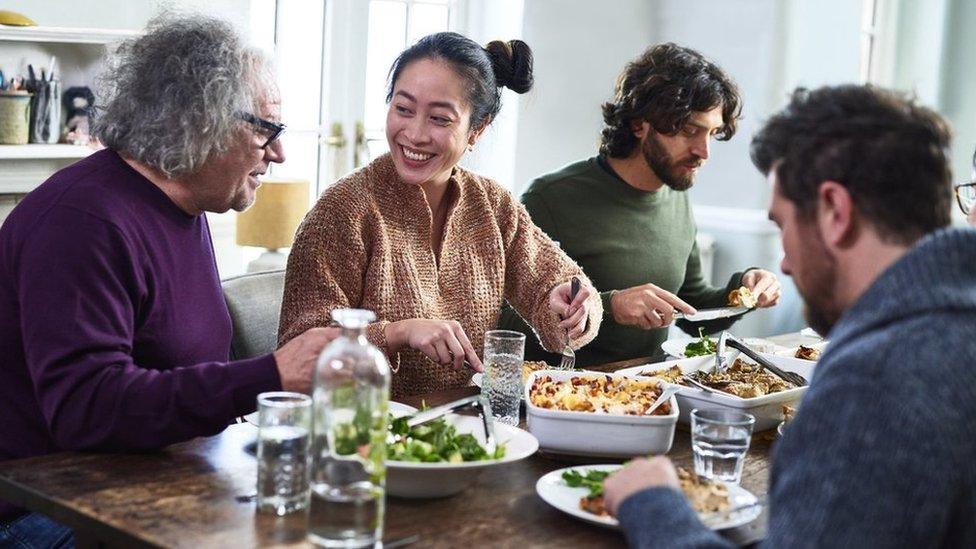Covid: Is it safe to meet indoors when vaccinated?
- Published

I've had both doses of a Covid vaccine and if you've had both doses too then what would be the risk if we met indoors?
Clearly, it would be completely against the rules in the UK for next few weeks.
However, England's deputy chief medical officer Prof Jonathan Van-Tam said such a gathering would be "incredibly safe".
And in the United States, the Centers for Disease Control has outlined a significant relaxing of the rules, external for people who have been fully vaccinated, which includes meeting others indoors.
So what are the risks and why aren't indoor meetings already back on the menu?
Three things combine to make it theoretically safe, if not completely free of risk:
the low levels of the virus in the UK
protection from catching the virus
and protection from spreading it after being vaccinated
The number of people testing positive in the UK is about 97% lower than the peak in January.
Studies have shown the risk of being infected falls by about two-thirds after just one dose of either the Oxford-AstraZeneca or Pfizer-BioNTech vaccines. Two doses of Pfizer leads to a 90% reduction, although there is still not enough data on for AstraZeneca.
Then a study by Public Health England showed people who had one dose of vaccine were up to half as likely to pass on the virus, even if they did catch it. A second dose is expected to lead to an even greater reduction.
King's College London researchers, working on the Zoe Covid Study app, estimate the risk of catching Covid tomorrow is:
one in 45,000 if you have not been vaccinated
one in 100,000 if you have had one dose of a vaccine
one in 150,000 if you have had two doses of a vaccine
Prof Van-Tam said: "If two people who both had two doses of vaccine, and have both served at least 14 days after their second dose, then I would be highly confident scientifically that if they were reputable vaccines then indeed it would be incredibly safe for those two people to meet."
However, Paul Hunter, a professor of medicine at the University of East Anglia, said that was true because the main variant of the virus in the UK was B117 (the one that was first detected in Kent) and that could change.
"The issue is variants with escape mutations that are less affected by the vaccine, and we haven't come to clear understanding of what those risks are," he said.
At the moment, indoor meet-ups are not back on the cards until at least 3 May in Wales, 17 May in England and Scotland and 24 May in Northern Ireland.
Prof Van-Tam said: "It is going to be frustrating at times for people, particularly those who've had their two doses, but we just need to make sure we don't have to go backwards again on any of this and just hold the line a teeny bit longer."
To allow such greater mixing after vaccination would introduce new issues around fairness, as well as how to police different rules for people who may all live in the same household.
And while the vaccination programme is continuing to motor on, only one in four adults has had both doses. Health secretary Matt Hancock said the plan was to "move together".
Dr Mary Ramsay, head of immunisation at Public Health England, said: "We are trying to say that this is about the population as a whole rather than the individuals, those privileged individuals who have had two doses, being somehow able to do things that other people cannot."
Follow James on Twitter, external
- Published2 April

